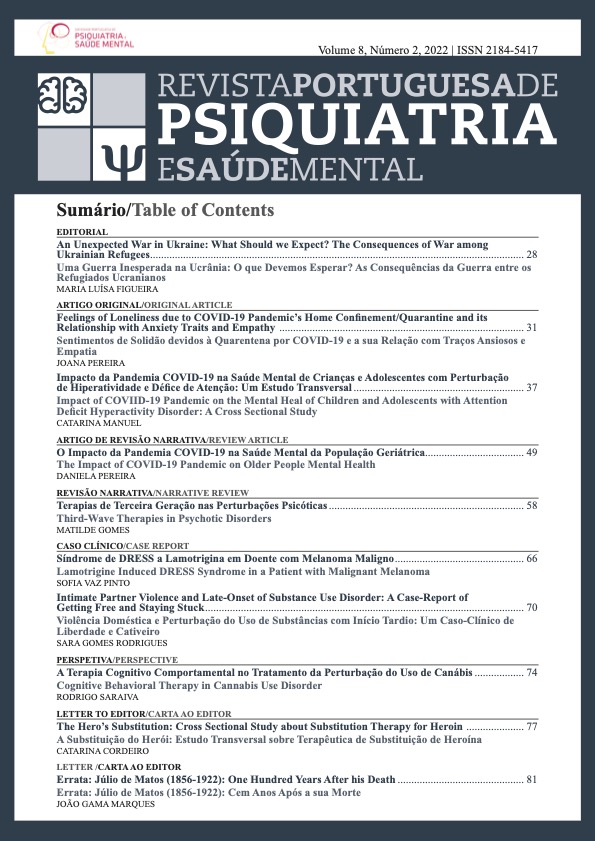Feelings of Loneliness due to COVID‑19 Pandemic’s Home Confinement/ Quarantine and its Relationship with Anxiety Traits and Empathy
DOI:
https://doi.org/10.51338/rppsm.292Keywords:
COVID-19, SARS-CoV-2, Empathy, Loneliness, Anxiety, Social Isolation, Pandemics, Mental HealthAbstract
Introduction: We aimed to understand how loneliness and empathy relate to home confinement/quarantine and to explore the relation between loneliness, anxiety traits and empathy.
Methods: This is an observational cross‑sectional cohort study including 364 participants. We delivered an online questionnaire composed by UCLA Loneliness scale (assessing loneliness), STAI‑Y (assessing trait anxiety), and IRI (assessing empathy). For the statistical analysis we performed descriptive and inferential statistics. When not‑otherwise specified, two‑tailed p<0.05 was considered significant.
Results: The mean for IRI was 60.46 (SD: 10.88), for UCLA Loneliness scale was 32.70 (SD: 8.11) and for STAI‑Y was 42.01 (SD: 12.29). We found no statistically significant correlation between empathy and loneliness (p>0.05). Nonetheless, loneliness and anxiety traits were positively correlated (p<0.05), and psychiatric comorbidity was associated with higher levels of loneliness and anxiety traits (p<0.05).
Conclusion: Our results suggest social cohesion, solidarity and continuous online contact may have played a significant role on preservation of empathy and feelings of loneliness. The fact that loneliness may be felt in a positive way (such tightening household relationships) can explain the non‑correlation
between the last and empathy. Ultimately, the positive correlation between anxiety traits and loneliness underlines the vulnerability of previously anxious subjects, enhancing the importance of promoting mental health during the pandemic.
Downloads
References
Brooks S, Webster R, Smith L, Woodland L, Wessely S, Greenberg N, et al. The psychological impact of quarantine and how to reduce it: rapid review of the evidence. The Lancet. 2020;395.
Choi EPH, Hui BPH, Wan EYF. Depression and Anxiety in Hong Kong during COVID-19. International journal of environmental research and public health. 2020;17(10).
Salari N, Hosseinian-Far A, Jalali R, Vaisi-Raygani A, Rasoulpoor S, Mohammadi M, et al. Prevalence of stress, anxiety, depression among the general population during the COVID-19 pandemic: a systematic review and meta-analysis. Globalization and Health. 2020;16(1):57.
Vanderbruggen N, Matthys F, Van Laere S, Zeeuws D, Santermans L, Van den Ameele S, et al. Self-Reported Alcohol, Tobacco, and Cannabis Use during COVID-19 Lockdown Measures: Results from a Web-Based Survey. European addiction re-search. 2020:1-7.
Huang Y, Zhao N. Generalized anxiety disorder, depressive symptoms and sleep quality during COVID-19 outbreak in China: a web-based cross-sectional survey. Psychiatry research. 2020;288:112954.
Heinrich LM, Gullone E. The clinical significance of loneliness: a literature review. Clinical psychology review. 2006;26(6):695-718.
Yanguas J, Pinazo-Henandis S, Tarazona-Santabalbina FJ. The complexity of loneliness. Acta Biomed. 2018;89(2):302-14.
Horesh D, Kapel Lev-Ari R, Hasson-Ohayon I. Risk factors for psychological distress during the COVID-19 pandemic in Israel: Loneliness, age, gender, and health status play an important role. British journal of health psychology. 2020.
Kılınçel Ş, Kılınçel O, Muratdağı G, Aydın A, Usta MB. Factors affecting the anx-iety levels of adolescents in home-quarantine during COVID-19 pandemic in Turkey. Asia-Pacific psychiatry : official journal of the Pacific Rim College of Psychiatrists. 2020:e12406.
González-Sanguino C, Ausín B, Castellanos M, Saiz J, López-Gómez A, Ugidos C, et al. Mental health consequences during the initial stage of the 2020 Coronavirus pandemic (COVID-19) in Spain. Brain, behavior, and immunity. 2020;87:172-6.
Hawkley L, Burleson M, Berntson G, Cacioppo J. Loneliness in Everyday Life: Cardiovascular Activity, Psychosocial Context, and Health Behaviors. Journal of per-sonality and social psychology. 2003;85:105-20.
Jones WH, Hobbs SA, Hockenbury D. Loneliness and social skill deficits. J Pers Soc Psychol. 1982;42(4):682-9.
Rotenberg K. Loneliness and Interpersonal Trust. Journal of Social and Clinical Psychology. 1994;13:152-73.
Segrin C. Chapter 8 - Interpersonal communication problems associated with depression and loneliness. In: Andersen PA, Guerrero LK, editors. Handbook of Com-munication and Emotion. San Diego: Academic Press; 1996. p. 215-42.
Neto F. Avaliação da solidão. Psicologia Clínica. 1989(2):65-79.
Silva D. Inventário de Estado-Traço de Ansiedade (S.T.A.I). Coimbra: Quarteto Editora; 2003.
Limpo T, Alves R, Castro S. Medir a empatia: Adaptação portuguesa do Índice de Reactividade Interpessoal. Laboratório de Psicologia. 2013;8.
Aylaz R, Aktürk Ü, Erci B, Öztürk H, Aslan H. Relationship between depression and loneliness in elderly and examination of influential factors. Archives of gerontology and geriatrics. 2012;55(3):548-54.
Esmaeilzadeh S, Oz F. Effect of psychosocial care model applied in an "elderly day care center" on loneliness, depression, quality of life, and elderly attitude. Nigerian journal of clinical practice. 2020;23(2):189-97.
Neto F. loneliness among portuguese adolescents. social behaviour and per-sonality. 1992:15-22.
Yu K, Wu S, Chi I. Internet Use and Loneliness of Older Adults Over Time: the mediating effect of social contact. The journals of gerontology Series B, Psychological sciences and social sciences. 2020.
McCormick L. Marking time in lockdown: heroization and ritualization in the UK during the coronavirus pandemic. American Journal of Cultural Sociology. 2020;8(3):324-51.
Kalliopuska M. Empathy and the Experiencing of Loneliness. Psychol Rep. 1986;59(3):1052-4.
Suedfeld P, Halliwell J, Rank AD, Buckley N. Psychosocial aspects of space-flight and aging. REACH - Reviews in Human Space Exploration. 2016;2.
Martínez J. Space Travels and Empathy: A New Area of Educational Interven-tion. 2017. p. 3-21.
Beadle JN, Brown V, Keady B, Tranel D, Paradiso S. Trait empathy as a predic-tor of individual differences in perceived loneliness. Psychol Rep. 2012;110(1):3-15.








